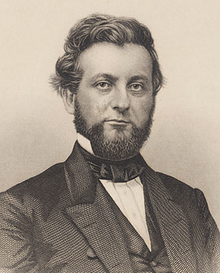Joel Parker (November 24, 1816 â€" January 2, 1888) was an American Democratic Party politician, who served as the 20th Governor of New Jersey from 1863 to 1866, and again from 1872 to 1875.
Early life, family

Parker was born near Freehold Township, New Jersey to Charles and Sarah (Coward) Parker. His father was a member of the New Jersey Legislature for several years, and served one term as state treasurer. Joel attended the College of New Jersey (later known as Princeton University), graduating in the class of 1839. He worked in the law office of Henry W. Green and was admitted to the bar in 1842. He married Maria Mott-Gummere in 1843 and the couple had two sons and a daughter.
Political career
A Democrat, he was elected to the New Jersey General Assembly in 1847, where he served until 1851 when he was appointed the "prosecutor of pleas" of Monmouth County. He continued to be active in politics and served as a New Jersey elector in the 1860 presidential election, casting his vote for Stephen A. Douglas.
In 1860, New Jersey Governor Charles Smith Olden appointed Parker Major General of the New Jersey militia.
Governor
He was nominated for Governor by the Democratic Party in 1862, and ran as a "War Democrat" who supported a military solution to the American Civil War rather than accommodation of the Confederacy. He defeated Marcus L. Ward by the largest margin in New Jersey history up to that time.
Although staunchly in favor of the war, Parker was also highly critical of the Lincoln Administration's actions with respect to curtailing civil liberties in the name of the war effort, castigating Lincoln for suspending habeas corpus and for what Parker considered the unconstitutional nature of the Emancipation Proclamation.
During Lee's invasion of Pennsylvania in 1863, Parker supplied several organized regiments of New Jersey volunteers that were sent to protect that state, but when a levy of 12,000 men was made on New Jersey in 1864, to make good a supposed deficiency in her former quotas, he obtained from President Lincoln the withdrawal of the order. In 1863, Parker attended the ceremonies dedicating the Soldiers' National Cemetery at which Lincoln delivered the Gettysburg Address. Parker established a method of settlement of the war debt so that not a bond of the state of New Jersey was sold below par, and at the close of the war in 1865 there was a surplus of $200,000 in the state treasury.
He strongly favored amnesty toward those that had actively supported the Confederacy in the Civil War. He was the "favorite son" candidate supported by New Jersey electors at the Democratic National Conventions in 1868, 1876, and 1884. In 1868, the New Jersey delegation cast their full vote for him in every ballot for the presidential nomination.
Parker was re-elected Governor in 1871 and served until 1874. He was then Attorney General of New Jersey in 1875 and later served as a justice on the New Jersey Supreme Court from 1880-1888.
Later life
After serving as Governor, Parker returned to the practice of law. He died on January 2, 1888, in New York City. He was buried in Maplewood Cemetery, in Freehold Township, New Jersey.
See also
- List of Governors of New Jersey
References
External links
- Biography of Joel Parker, New Jersey State Library
- New Jersey Governor Joel Parker, National Governors Association
- Political Graveyard information for Joel Parker
- Dead Governors of New Jersey bio for Joel Parker
- Joel Parker at Find a Grave
- Â "Parker, Joel. An American politician". New International Encyclopedia. 1905.Â






0 komentar :
Posting Komentar